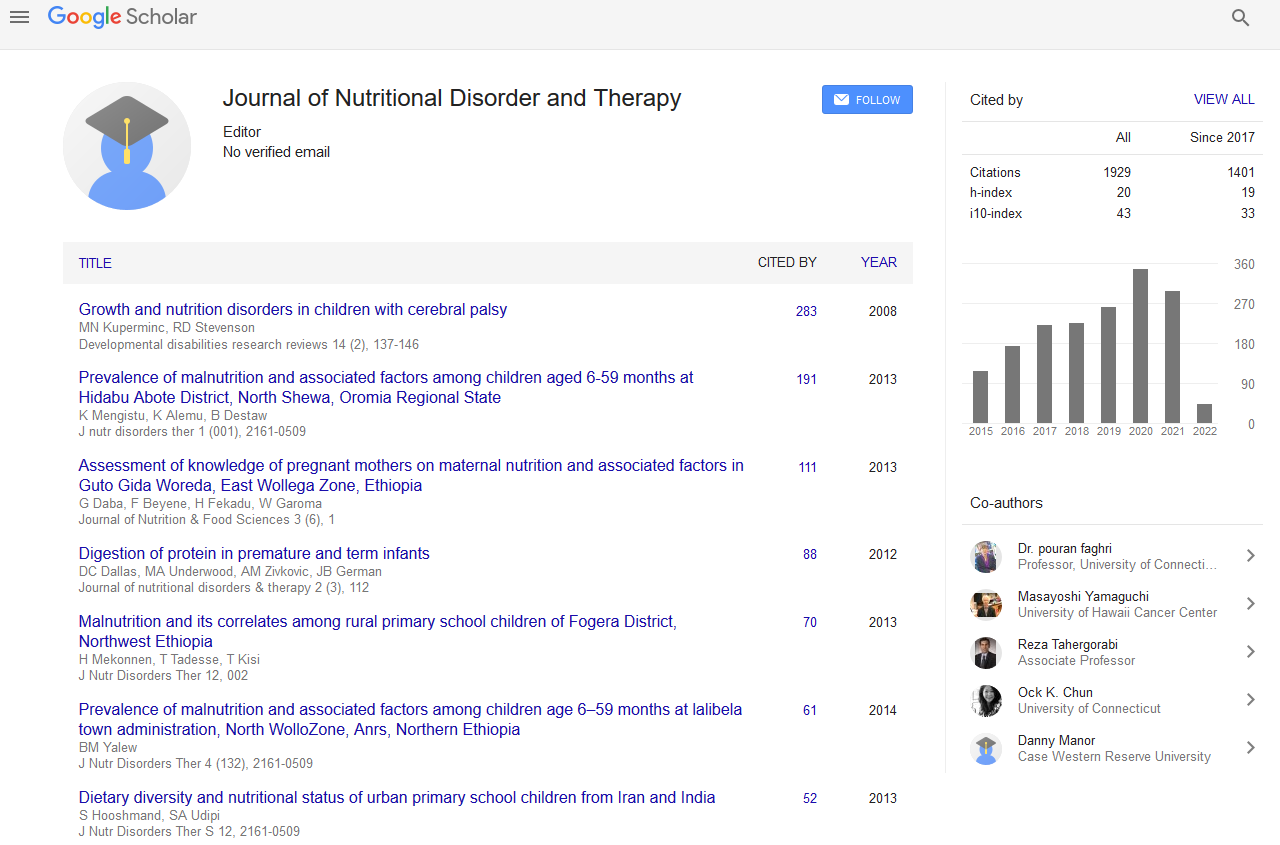Indexed In
- Open J Gate
- Genamics JournalSeek
- Academic Keys
- JournalTOCs
- Ulrich's Periodicals Directory
- RefSeek
- Hamdard University
- EBSCO A-Z
- OCLC- WorldCat
- Publons
- Geneva Foundation for Medical Education and Research
- Euro Pub
Useful Links
Share This Page
Journal Flyer

Open Access Journals
- Agri and Aquaculture
- Biochemistry
- Bioinformatics & Systems Biology
- Business & Management
- Chemistry
- Clinical Sciences
- Engineering
- Food & Nutrition
- General Science
- Genetics & Molecular Biology
- Immunology & Microbiology
- Medical Sciences
- Neuroscience & Psychology
- Nursing & Health Care
- Pharmaceutical Sciences
Abstract
Know-how and Know-why Nutrients may be Less Bioaccessible and Less Bioavailable due to Proton Pump Inhibitor - Food Interactions and Incompatibilities Involving Metal-Aquo Complexes
Helena Jenzer, Irene Marty, Sandra Büsser, Marta Silva, Franziska Scheidegger-Balmer, Linda Jennifer Ruch, Sofia Martins, Noëmi Dajanah Maurer-Brunner, Francesca Rotunno and Leila Sadeghi
Background: Proton pump inhibitors change gastric pH from around 2.0 to 2.5 to more than 4.0 for up to 16 hours per day and suppress gastric function widely. Risk factors assigned to long-term inhibition of gastric acidity arise from cleavage-resistance of peptides and glycosides, mucosal degeneration and leak, loss of bactericidal action, and modification of absorption kinetics of medicines and nutrients. This article aims to contribute to wisely use of proton pump inhibitors and to recommend nutritional options.
Methods: A systematic online literature research was performed on usual platforms. Recommendations rely on a multidisciplinary focus group assessment. Explanations arising from the retrieved references were tested for consistency by titration of iron solution from acidic to basic pH while observing precipitation.
Results and discussion: Literature describes bacterial overgrowth, community and hospital-acquired pneumonia, childhood asthma related to PPI treatments of mothers in pregnancy, sensitization to food allergens in the elderly and in pregnant women (as progesterone slows down gastric emptying), deterioration of intolerances, and various diseases such as celiac and inflammatory diseases. In addition to pathologies, bioavailability of medicines may be modified dramatically. For micronutrients, aquo-complexes of metal ions revealed to be a neglected issue in research of food-drug interactions arising from PPI treatments.
To prevent these complications, a focus group from a clinical support team recommends intermittent and ondemand strategies, alternative antacids, avoidance of high allergenic food, buffering, pepsin replacement, stimulation of digestion and peristalsis, and physical activity, and medicines review and reconciliation.
Conclusion: Proton pump inhibitor safety profiles are troubled by risk factors arising from inappropriate longterm use. Drugs’ bioavailability may increase as a result of mucosal hyperpermeability, or decrease as a result of altered dissociation. Care should be given to substrates with pKa<4.5 as well as to micronutrient supply. At least children and pregnant women should prefer alternative antacids.


